Executive salary potential in Malta
| Sector |
Sample role |
Senior salary range (€) |
| Technology and iGaming |
Artificial intelligence (AI) architect, cybersecurity specialist |
€40,000 to €130,000 |
| Financial services |
Financial controller |
Around €65,000 |
| Executive leadership |
Chief financial officer (CFO) |
Average around €82,126 |
| General management |
Chief executive officer (CEO) |
Highly competitive |
(Source: Salary Expert, Career Jet)
The GBS Malta MBA programme enhances this value proposition through its structure. It is a Level 7 qualification, requiring 90 ECTS credits. It offers unparalleled specialisation options through five distinct pathways, including marketing management, project management (APM accredited), entrepreneurship, management consulting and global investment banking.
Furthermore, the financial aspect is significantly mitigated by the Malta Get Qualified scheme. This government-approved scheme allows successful MBA students in Malta to claim back up to 70% of their €10,000 tuition fees as tax credits after graduation, provided they live and work in Malta for at least two years.
Top hurdles for MBA students in Malta face when trying to balance work and study
Everyone pursuing an MBA in Malta faces resistance, and that’s a fact. The difficulty isn't just about the intellectual demands of the coursework; it’s the physical and mental toll exerted by the relentless double shift.
Many ambitious MBA students in Malta underestimate the grind, the constant pressure to perform impeccably both in the office and in the classroom. Recognising these common roadblocks is the most fundamental tip for MBA students who wish to achieve true, sustainable balance between work and study.
The logistics of life on the island present specific issues.
Although Malta is physically small, localised traffic congestion or peak season delays during your commute between work and campus can easily derail a tightly planned study schedule.
Requiring high efficiency for evening classes immediately after a long workday is a recipe for exhaustion. Also, there is mental fatigue that results from constant context switching.
Constantly jumping between the strategic mindset required for a Global Strategies module and the detailed professional spreadsheet of your job leads to significant energy depletion. This demand for mental agility is a major, often overlooked, hurdle.
Finally, the personal cost manifests itself as social isolation or guilt. Personal life inevitably suffers temporary setbacks, and missing social events, family time, or essential self-care sessions leads to guilt, which is a hidden cost of trying to balance work and study.
For international MBA students in Malta, this feeling is compounded by adapting to a new cultural and academic system.
It is often observed that the perceived difficulty of juggling work and studies can outweigh the actual difficulty of the tasks themselves. This occurs because the main challenge is not necessarily the sheer volume of work, but rather the failure to establish robust mental and logistical boundaries.
If you don't define and defend your boundaries, the demands of the job will always encroach on the study time, and vice versa. It becomes clear that the key to managing this period is strategic boundary-setting to protect time and energy, which is far more effective than just chasing productivity hacks.
This approach leads to a more solid long-term balance to manage work and study.
Actionable tips for MBA students to master work-study balance
Juggling a professional role with an advanced degree doesn't have to feel like perpetual chaos. These strategies are more than just organisational hacks; they're essential lifestyle shifts.
They are the defining tips for MBA students who want to turn the demanding pace of professional life into a competitive advantage. Mastering this equilibrium is arguably the quickest path to securing significant career growth after MBA in Malta.
Mastering time and prioritisation for success
Excelling in your MBA while navigating professional life in Malta requires a strategic system that goes beyond simple to-do lists. Success hinges on two non-negotiable pillars: a rock-solid, adaptive schedule and the professional art of prioritisation. Here’s how to build both.
1. Architect your schedule
At this level, time blocking is mandatory. Don’t just list tasks; proactively block specific times on your calendar for your MBA classes and self-study. Leverage the strategic intakes offered by GBS Malta (February, May, October) to plan your academic year around peak professional demands, ensuring you’re not starting a new module during your busiest season at work.
To make this work in Malta, two rules are critical:
- The 'Buffer Zone' Rule: Always build 30-minute gaps between commitments. Malta's commutes can be unpredictable, and these short buffers prevent one delay from causing your entire evening study session to collapse.
- The 'Cognitive Peak' Rule: Audit your energy levels. Are you a morning wizard? Block that prime time for complex analytical work or drafting your dissertation. If you hit an afternoon slump, reserve that slot for low-focus tasks like administrative emails or reviewing lecture notes.
Furthermore, you must utilise the flexible nature of the GBS Malta MBA programme. Its structure, which blends face-to-face sessions with substantial self-study freedom, allows you to adjust your work hours with your employer. This synergy is key to maximising your productive time and is what separates successful students from those who struggle.
2. The art of strategic focus and 'No'
A solid schedule is useless if filled with the wrong tasks. You must adopt a triage system for your responsibilities. Focus 80% of your energy on what is both urgent and important (client deadlines, final summative assessments) and what is important but not urgent (dissertation drafting, professional networking). Everything else should be minimised, postponed, or eliminated.
This philosophy extends to delegation and smart work:
- Delegate strategically at work: If your company supports your MBA, they value your upskilling. Negotiate delegating low-value, high-time tasks to colleagues. Frame this temporary boundary-setting as an investment, ensuring you return with enhanced leadership skills for greater career growth after your MBA in Malta.
- Study smarter, not longer: Utilise the programme’s formative assessments fully. These lower-stakes assignments are your tool to grasp concepts before the high-stakes summative exams, saving you hours of stressful, last-minute revision.
Ultimately, this level of discipline requires mastering one of the most effective skills: the art of a graceful but firm 'no'. Politely declining non-essential commitments protects your focus and energy, ensuring you deliver excellence where it truly matters.
By combining a Malta-optimised schedule with ruthless prioritisation, you transform the MBA challenge from a source of stress into a strategic investment in your future.
Open doors to your career growth with support networks
No professional should go it alone.
The MBA programme at GBS Malta actively supports networking and peer learning. Faculty members at GBS Malta often have deep industry ties and should be viewed not just as teachers, but as potential mentors who can open doors to career growth after MBA in Malta.
MBA students in Malta should proactively join professional associations and attend networking mixers. These events double as essential learning and connecting opportunities. Your online presence, particularly on platforms like LinkedIn, should reflect the high ambition of an MBA student in Malta.
Finally, establish study pods for accountability.
Group projects and shared study time reduce isolation and significantly improve learning efficiency. Holding virtual check-ins with peers helps MBA students in Malta realise they aren't alone in the struggle to balance work and study.
How the MBA at GBS Malta makes balancing work and study easier
GBS Malta structured its MBA programme to acknowledge the demanding reality of the working professional. Unlike rigid, traditional programmes, the MBA at GBS Malta prioritises flexibility and relevance, recognising that MBA students in Malta need adaptable scheduling options.
Programme structure
The programme structure is explicitly designed to support emphasises practical assessment methods over high-pressure, single-point exams, making it exceptionally conducive to achieving a successful balance between work and study.
The structure is built for professionals. The 90 ECTS Programme is offered full-time (one year) allowing participants to pace the required self-study around their most intense work phases. Multiple intakes throughout the year (October, February and May) mean you can choose to begin your studies when your professional schedule allows for the least disruption.
MBA Assessment
The assessment model is a huge advantage.
Assessments are deliberately diverse and practical, including essays, case studies, reflective learning logs, portfolios, and group presentations.
This means the time spent studying directly translates into portfolio-ready skills, immediately boosting your potential for career growth after MBA in Malta. The focus on formative assessment further supports students by identifying areas of improvement early on, ensuring they are well-prepared for summative requirements.
This practical assessment approach mitigates academic pressure felt by MBA students in Malta.
Also, financial support via the Get Qualified scheme provides a powerful financial strategy. The ability to reclaim up to 70% of the €10,000 tuition fee eases the overall financial burden on students, allowing them to focus more intensely on academic and professional success and less on financial strain.
Turning the juggle into a superpower

We’ve established that pursuing an MBA in Malta requires grit, meticulous planning and strategically applied tips for MBA students.
From leveraging Malta’s powerful, high-demand economy for salary jumps to using GBS Malta’s flexible structure to your advantage, every challenging moment you face while trying to balance work and study builds the resilience and strategic agility required for executive leadership.
This demanding period is not simply about earning a qualification; it is about forging the highly effective, decision-making leader ready for significant career growth after MBA in Malta. Give yourself permission to prioritise ruthlessly, plan relentlessly, and lean on the supportive systems available to you.
Secure your future trajectory today.
Apply Now.




